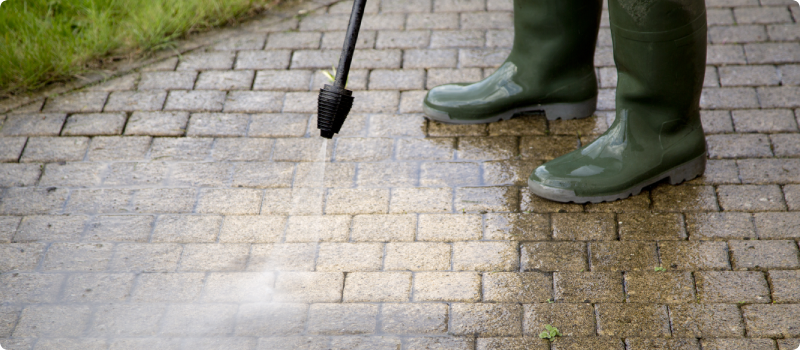Removing Oil Stains from a Driveway
Updated May 3, 2024 . AmFam Team
As a homeowner, you work hard to maximize your home’s curb appeal. But when it comes to your driveway and sidewalks, residual motor oil, gasoline and other fluids from your vehicles can leave unsightly spots.
But don’t worry — we’ve identified the culprits and rounded up some ways to help remove oil stains from concrete and get your driveway, sidewalks and garage floor cleaner than they’ve ever been before.

Types of Oils that Stain Concrete
There are plenty of types of fluid that can leave oil stains on concrete, and most of them are pretty hard to avoid. But knowing the type of oil stain that’s on your driveway can help you know how and when it should be removed. Here’s a list of the more common fluids that leave stains on concrete:
Gasoline
When there’s a gasoline stain on your driveway from a vehicle, you need to get your car or truck to a repair shop right away. Take care to avoid spills when refilling your lawn mower or other gas-powered vehicle that's not typically filled up at the pump. Gasoline should be cleaned up as soon as possible, as it’s quite flammable and damaging to the environment.
Transmission Fluid
When transmission fluid stains your driveway, it may be time get your ride to the repair shop. Transmission fluid is usually red and drips from the middle of your car or truck. The longer transmission fluid sits on concrete, the harder it is to remove.
Rock Salt and Ice Melt Products
After snow removal salt has served its purpose and saved you from a nasty slip on the ice last the winter, it’ll likely leave stains on concrete as it melts snow and ice and the water drains away.
Motor Oil
Engine oil leaks from any sort of vehicle are relatively common and should also be cleaned up right away. While you’re able to remove oil from a concrete driveway fairly easily, it can do some serious damage when tracked into your home and onto floors and carpets.

Cleaning Oil Stains from Concrete
The good news? There are plenty of simple ways to remove an oil spot on a driveway — and you don’t need to buy environmentally harmful, dangerous or expensive chemicals to get the job done.
As a rule of thumb, oil stains that are still wet should be treated with absorbents that soak up the oil, such as cat litter or dirt. Stains that have dried and settled onto your driveway or sidewalk can be more challenging and require repeated steps to fully clean. Steps to remove old oil stains from concrete are outlined below:
Pour Cat Litter on the Oil Stain
For a newly formed oil stain, try using kitty litter first. Soak up the excess oil with a cloth then follow these steps:
- Completely cover the stain with kitty litter
- Let the kitty litter sit for thirty minutes if the stain is small, or overnight if large
- Sweep up the kitty litter from the stain
- Scrub the stain clean with a bristle brush and detergent (such as laundry or dish)
- Rinse with water
- Repeat if necessary
Treat the Concrete Stain with Baking Soda
If you don’t have kitty litter, baking soda is your next best bet. Like kitty litter, it’s quite absorbent and does a great job of lifting any moisture after being applied. Remove the oil stain with baking soda using these simple steps:
- Sprinkle a thick layer of baking soda over the oil stain in your driveway
- Let it soak in for thirty minutes
- Clean the stain by scrubbing it with a bristle brush
- Wash away the baking soda with clean water
- Repeat if necessary
If baking soda didn’t get the stain out, try using the following methods to attack it.
Use Laundry Detergent or Dish Washing Liquid
Laundry or dish washing detergent are potent enough to help with cleanup outside the house too. Both products are very effective at removing driveway oil stains, so here’s how to tackle it:
- Pour a detergent (such as laundry or dish) over the oil stain
- Scrub it with a strong-bristled brush
- Let the stain sit for an hour
- Wash away the stain with hot water
- Repeat if any stain remains
WD-40
In addition to fixing that annoying squeaky door hinge or preventing your car locks from freezing, WD-40 is a great moisture remover. You can also use WD-40 on oil stains on your driveway with the following steps:
- Apply it over the entire stain
- Scrub the stain with a thick-bristled brush
- Rinse the area with water
- Soak up what remains with cat litter or baking soda

Use Concrete Cleaner
If removing your driveway’s oil stain using absorbents and household cleaners didn’t work, there are a wide variety of commercial cleaners designed specifically to get rid of oil stains. Head to a local hardware store and ask for a cleaner that fits your needs.
Concrete with other stains and debris may benefit from a good pressure washing after your work is done. If all else fails, reach out to a professional cleaning service to have those stubborn stains removed.
Looking for more ways to keep your home well-maintained? Our home maintenance checklist can help you keep the things you work so hard for in top condition.
Protect Your Home and Investment
After you’ve cleaned up your driveway, sidewalks, garage and any other oil-stained concrete around your home, make sure you give the same attention to your house, your family and your property. That can include protecting your home with a homeowners insurance policy customized to fit your needs, and additional coverages like hidden water damage and equipment breakdown coverage for extra protection.
Your American Family Insurance agent is always happy to help you get the insurance policies you need to give you the peace of mind you deserve. Get in touch today.
This article is for informational purposes only and based on information that is widely available. We do not make any guarantees or promise any results based on this information.
This information represents only a brief description of coverages, is not part of your policy, and is not a promise or guarantee of coverage. If there is any conflict between this information and your policy, the provisions of the policy will prevail. Insurance policy terms and conditions may apply. Exclusions may apply to policies, endorsements, or riders. Coverage may vary by state and may be subject to change. Some products are not available in every state. Please read your policy and contact your agent for assistance.

